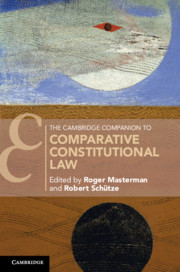Book contents
- Reviews
- The Cambridge Companion to Comparative Constitutional Law
- Cambridge Companions to Law
- The Cambridge Companion toComparative Constitutional Law
- Copyright page
- Contents
- Notes on Contributors
- Acknowledgements
- Table of Cases (Selection)
- Abbreviations
- Introduction
- Part I Theoretical Foundations
- Part II Historical Experiences
- Part III Constitutional Principles
- Part IV State Institutions
- 13 Parliaments
- 14 Governments
- 15 Administration
- 16 Courts with Constitutional Jurisdiction
- 17 Independent Fiscal Institutions
- Part V Transnational Constitutionalism
- Index
- References
13 - Parliaments
from Part IV - State Institutions
Published online by Cambridge University Press: 30 September 2019
- Reviews
- The Cambridge Companion to Comparative Constitutional Law
- Cambridge Companions to Law
- The Cambridge Companion toComparative Constitutional Law
- Copyright page
- Contents
- Notes on Contributors
- Acknowledgements
- Table of Cases (Selection)
- Abbreviations
- Introduction
- Part I Theoretical Foundations
- Part II Historical Experiences
- Part III Constitutional Principles
- Part IV State Institutions
- 13 Parliaments
- 14 Governments
- 15 Administration
- 16 Courts with Constitutional Jurisdiction
- 17 Independent Fiscal Institutions
- Part V Transnational Constitutionalism
- Index
- References
Summary
In a modern sense, parliaments and constitutions are born together as two essential elements of the liberal state. Both of course had their own ancestors – in royal advisory assemblies and in legal documents binding the monarch in some way, respectively – but both reached maturity together, mutually presupposing and reinforcing. No (modern) constitution could be recognized as such had it not provided for a representative assembly, elected by all the citizens at that time entitled to political rights. Reciprocally, no (modern) parliament could define itself as a political representative assembly without one or more fundamental charters designing its main structural and functional features, attributing to it some prerogatives, and protecting the main political rights of the citizens, such as the freedom of speech, of the press and of meeting and association, in addition, of course, to the right to vote.
- Type
- Chapter
- Information
- The Cambridge Companion to Comparative Constitutional Law , pp. 335 - 360Publisher: Cambridge University PressPrint publication year: 2019

